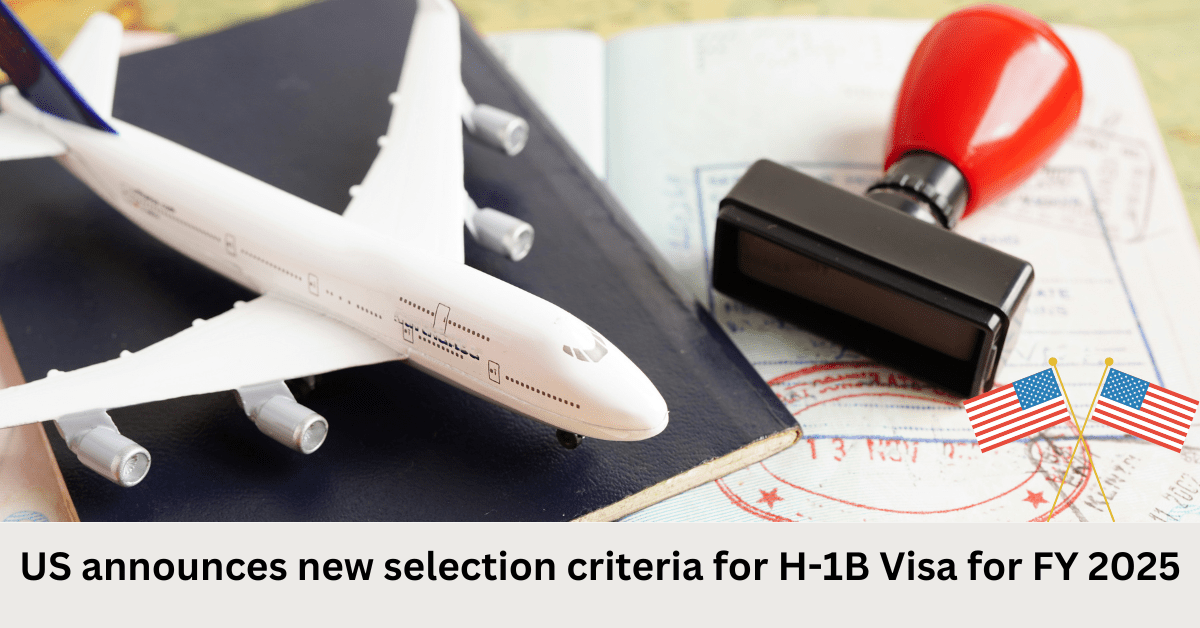To improve the integrity of the H-1B Visa registration procedure and lower the possibility of fraud, US Citizenship and Immigration Services (USCIS) has put in place a new rule. This rule introduces a beneficiary-centric selection process and will take effect with the fiscal year 2025 (FY 2025) H-1B cap. Regardless of the quantity of registrations made on their behalf, the objective is to guarantee equity and equal opportunities for all beneficiaries.
The new rule states that distinct beneficiaries will be taken into consideration when choosing registrations, as opposed to the quantity of registrations received. The purpose of this modification is to lessen the possibility of fraud and guarantee that each beneficiary has an equal chance of being chosen. USCIS will require registrants to provide valid passport or travel document information for each beneficiary starting with the initial registration period for FY 2025.
The final rule also makes clear what happens to certain petitions that are subject to the H-1B cap in terms of the required employment start date. Starting on October 1st of the relevant fiscal year, petitions can now be filed with requested start dates.
Additionally, the USCIS has announced that Forms I-129, Petition for a Nonimmigrant Worker, and Form I-907, Request for Premium Processing Service, for H-1B petitioners, will now be available for filing online.
Final Rule for H-1B Registration
- This final rule includes provisions that will codify start date flexibility for certain petitions subject to the congressionally mandated H-1B cap, establish a beneficiary-centric selection process for employer registrations, and add additional registration process integrity measures.
- Registrations will be chosen by a distinct beneficiary under the beneficiary-centric process, not by registration.
- For each beneficiary, registrants will need to submit valid passport or travel document information, starting with the FY 2025 initial registration period, according to USCIS.
- The beneficiary’s passport or other travel document must match the one they plan to use to enter the US if granted an H-1B Visa, should they find themselves abroad. The registration of each beneficiary under a single passport or travel document is required.
- In accordance with current policy, USCIS is also making clear the requirements for the requested employment start date on certain petitions that are subject to the congressionally mandated H-1B cap. This will allow filings with requested start dates that are after October 1st of the relevant fiscal year.
- The H-1B final rule also formalizes USCIS’s power to reject or cancel H-1B petitions in cases where the underlying registration was incomplete or contained a false attestation.
- As per the recently implemented regulation, USCIS has the authority to reject or cancel the approval of an H-1B petition in case it ascertains that the registration fee is refused, unresolved, contested, or deemed invalid subsequent to submission.
- The final rule for the Fee Schedule was also released by USCIS. Following the initial registration period for the FY 2025 H-1B cap, that rule will become operative. As a result, the $10 registration fee will not change during the registration period that begins in March 2024.
- Form I-129 with the updated Fee Schedule and H-1B Registration final rules will soon be available for preview on uscis.gov (edition date: 04/01/24). Form I-129 will only be accepted as of April 1, 2024 (04/01/24).
- A few of the provisions suggested in the Notice of Proposed Rulemaking (NPRM) dated October 23, 2023, have been finalized in the H-1B Registration final rule. Keep in mind that DHS plans to release a different final rule to address the remaining NPRM provisions.
Initial Registration Period For H-1B Visa
From March 6, 2024, to March 22, 2024, is when the first registration window for the FY 2025 H-1B cap will open. Proposing petitioners and their agents, if any, have until the end of the current period to electronically register each beneficiary for the selection process through a USCIS online account and pay the beneficiary’s registration fee.
An essential route for qualified foreign workers to support the US economy is the H-1B program. It permits US employers to fill specialized jobs with highly qualified foreign workers. Concerns about fraud and abuse have brought the program under close examination in recent years. The goal of the new regulation is to allay these worries and improve the program’s integrity.




